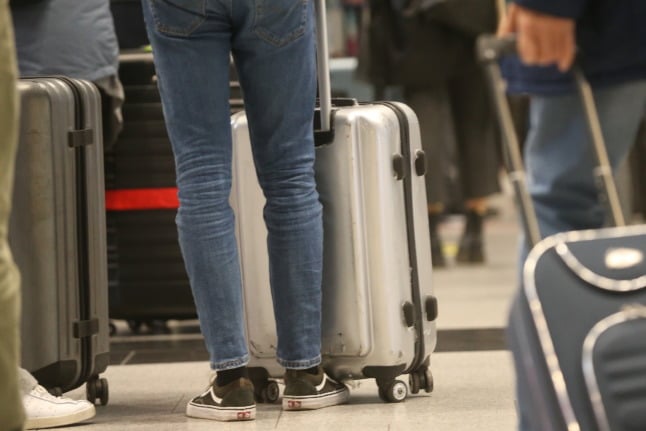End of compulsory working from home
As of July 1st, the regulations on workplace infection control in Germany will change due to low incidence rates and the sharp drop in Covid cases. As a result, the ‘home office’ obligation will expire at the end of June.
Companies will no longer be required to allow employees to work from home – and staff will also no longer have to accept this offer from their employer.
It’s still possible to work from home if your boss allows you to do so, though.
Bosses still have to offer staff attending their workplace regular Covid tests. In addition, social distancing rules, mask wearing and room ventilation must continue.
READ ALSO: End of home office: Are employees in Germany ready to return to the office?
Blanket travel warning lifted
The German government is changing its coronavirus travel system in July. Throughout most of the pandemic, a general travel warning has been in place, urging people not to travel for tourism.
But from July 1st authorities in Germany will no longer advise against tourist travel abroad.
READ ALSO: Is Germany set to tighten travel and quarantine rules?
Foreign Minister Heiko Mass said: “After long months of lockdowns, we can look forward to more normalcy, and that also applies to travelling.” However, he said warnings would remain in place for countries deemed high risk, and caution will be needed.
There are still concerns over the spread of the Delta variant so the German Foreign Office will implement the following system from July 1st:
- For countries and regions classified as high incidence or virus variant areas, a coronavirus-related travel warning will continue to apply
- For “basic” risk areas (seven-day incidence above 50 but below 200), non-essential tourist travel is discouraged
- For countries and regions of the EU not classified as risk areas, as well as Iceland, Liechtenstein, Norway and Switzerland, special caution is requested when travelling in view of the ongoing pandemic
- For non-EU countries not classified as risk areas, travel is advised against if restrictions (entry restrictions, quarantine obligation) persist, otherwise special caution is requested in view of the pandemic
READ ALSO: Germany to lift Covid travel warning for most countries from July 1st

EU digital Covid pass launches
Still on the topic of travel, this digital ‘travel pass’ should make things a little easier if you’re venturing out of the country.
Officially the EU’s Covid-19 certificate, as it’s properly known, launches across the bloc on July 1st.
From that date, people who can show they are fully vaccinated can travel anywhere within the EU or Schengen zone without needing to follow certain health measures, such as quarantining or testing. But note that strict measures remain in place for ‘virus variant’ countries, which currently includes Portugal.
Slightly confusingly, some nations already accept it. On Thursday, June 24th, Norway eased regulations to allow visitors from 12 EU countries to travel using the EU Covid certificate. For the rest, it will be available from July 1st.
According to German Health Minister Jens Spahn, all fully vaccinated people in Germany should be able to obtain a digital certificate by the end of June.
Along with Germany, the EU pass will soon be valid in countries such as Austria, Belgium, Bulgaria, Cyprus, Croatia, Denmark, Spain, Estonia, Finland, France, Greece, Hungary, Ireland, Italy, Latvia, Lithuania, Luxembourg, Netherlands , Poland, Portugal, Czech Republic, Romania, United Kingdom, Slovakia, Slovenia, Sweden, as well as Switzerland, Iceland, Liechtenstein, Norway.
READ ALSO:
- What is Germany’s new digital ‘CovPass’ and how can I get it?
- German pharmacies to start offering digital vaccine certificates
Minimum wage increase
The minimum wage in Germany will rise by 10 cents from €9.50 to €9.60 from July 1st. Over two years, the minimum wage is being raised step by step. By the end of 2022, the minimum wage is to rise to €10.45.
10 single-use plastics officially banned
As of July 3rd, changes to the Packaging Act will come into force. Germany approved the legislation last September, banning 10 disposable plastic products such as straws, cutlery and cotton buds that are polluting the world’s oceans.
Manufacturers will not be allowed to produce food and beverage containers made of Styrofoam from July. Furthermore cutlery, cosmetic cotton swabs, balloon sticks, stirrers, plates, bowls and drinking straws will also no longer be made from plastic.
If retailers and restaurants have remaining stocks, they can continue to hand them out so that they do not end up unused in the rubbish bin.
According to the EU Commission, the products prohibited under the law represent 70 percent of the waste that pours into oceans, posing a threat to wildlife and fisheries.
READ ALSO: Germany to ban disposable plastics by mid-2021
New EU VAT rules for imported goods
Imported goods with a value of €22 or less used to be exempt from tax, but this condition will be scrapped on July 1st across the EU.
This means all goods arriving into Germany and other EU countries from non-EU countries will be subject to VAT, regardless of their value.
This EU-wide regulation will particularly affect businesses that import goods from outside of the bloc and people who shop online on international websites such as China’s AliExpress.
If the goods cost more than €150 (not including transport, insurance and handling charges) you will also have to pay customs duty.
If businesses don’t register with the The Import One-Stop Shop (IOSS), the VAT will be paid by the customer when importing the goods into the EU.
Postal or courier companies may charge the customer an additional clearance fee to collect this VAT and carry out the necessary procedures when importing the goods.
New delivery procedure at DHL
There are changes to DHL’s delivery procedure that you should be aware of. Starting in July, parcel carriers will no longer have to ring the doorbell when they deliver a shipment to some customers.
Not all DHL customers are affected by this new regulation – only those who have previously selected a specific drop-off location. For some time now, it has been possible to specify a drop-off location to prevent a parcel from being dropped off at the nearest store when the customer is absent.
Such locations are often the customer’s own garage, terrace or flat corridor. Anyone who has selected this option in the past or wants to specify it in the future will no longer have their doorbell rung.

Real becomes Edeka, Kaufland or Globus
Shopping at the supermarket Real will soon no longer be possible. Since the beginning of the year, branches of the supermarket chain have been taken over or closed by Kaufland, Edeka or Globus. In July, there will be another wave of takeovers.
Pension increase in eastern Germany
Normally, retirement benefits increase in the summer. But this year that this is not the case in western Germany due to the cost of the Covid crisis.
However, pensioners in eastern states will get a marginal increase in their retirement benefits of 0.72 percent from July 1st, as the adjustments to the western levels are not being suspended. By 2024, the pension value in the east of Germany is to be brought into line with that in the west.
School holidays continue
School holidays have already started for children in some states, including Berlin, Brandenburg, Schlwesig-Holstein and Mecklenburg-Western Pomerania. But for many youngsters, they still haven’t kicked in. The other states will start their holidays in July.
Bavaria will be the last state to start on July 30th. August 1st will then mark the only weekend in Germany when all schoolchildren will be on summer holidays at the same time.
READ ALSO: Masks and Covid tests ‘should continue in schools until 2022’
Online gambling becomes legal across Germany
Online poker and roulette will be permitted under uniform federal rules that come into force at the beginning of July. Up to this point there have been different rules across states.
The State Gambling Treaty is intended to enable a uniform level of player and youth protection throughout Germany.
In future, for instance, a gaming account will be mandatory for online gambling. Players will have to identify and authenticate themselves. This is intended to exclude minors.
Players will also only be allowed to deposit up to €1,000 per month into the gaming account. At the same time, online poker and virtual slot machine games from private providers will be legalised within a narrow framework, the Berlin Senate Chancellery said. The aim, they say, is to curb the black market.




 Please whitelist us to continue reading.
Please whitelist us to continue reading.
Member comments